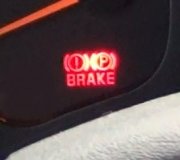When I first started working on the car, the brake pedal was very soft. With the car running, the pedal could be pressed easily to the floor. The front master cylinder reservoir was very low, but not empty. The rear was full (I think the rear reservoir is used only as a backup to replenish the front if it gets too low). I started by topping off the fluid, replacing the front pads and bleeding the brakes. None of this helped.
I then noticed that the brake pedal was very firm with the engine off. Also, whenever the car was running, pressing the brake pedal caused a momentary hissing sound from the booster. Unsure whether the problem was the booster or the master cylinder, I replaced both. The booster is a rebuild; the master cylinder is a new, US-made Bendix. Following replacement, I bled the master cylinder (on the vehicle) and all four wheels. I also checked to be sure the rear shoes were correctly adjusted.
The pedal is firmer now, and the brakes stop the vehicle. However, extended (moderate) pedal pressure will still push it to the floor. In addition, the pedal feels spongy at the point where the brakes engage. I bled the wheels a second time, but it didn't help.
Is there something I'm missing? Does this particular model require power bleeding of the master cylinder (or something similar)? I'll just add that the new booster doesn't seem to allow quite as much rearward travel of the linkage rod as the original. As a result, the brake pedal won't travel quite as far back, and I can't get it to actuate (turn off) the brake switch, even with the switch pushed fully forward. I don't think this is related to the "on the floor" pedal problem; I'm mentioning it only in hopes someone might have seen it and will have a suggestion. I don't want to return the booster unless it's absolutely necessary. I'm not a small person, and the hours I spent under the dash getting the parts in and out were no fun.
Any help with these problems will certainly be appreciated!
SPONSORED LINKS
Monday, October 22nd, 2007 AT 8:15 AM



